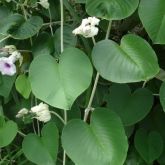Elephant ear vine

Elephant ear vine
© Queensland Government

Elephant ear vine flowers and leaves
© Queensland Government
Native to Burma and India, elephant ear vine is a perennial woody vine that can smother trees. It has been recorded as an invasive plant in Hawaii and is reported to have naturalised in several countries. Elephant ear vine is commonly used as an ornamental garden plant. There is a risk that it may invade rainforests and open eucalypt woodland in Queensland.
You must manage the impacts of elephant ear vine on your land.
You must not give away, sell or release elephant ear vine into the environment.
Scientific name
Other names
- Elephant creeper, baby woodrose, elephant climber, elephant creeper
Description
- Perennial woody vine climbing up to 10m high.
- Stems and leaf undersides have dense, white downy hairs.
- Leaves are large, heart-shaped, up to 30cm across.
- Flowers are pale pink/white, trumpet-shaped, with dark pink/violet centre 5cm in diameter.
- Berries are round, white.
Habitat
- Prefers tropical and subtropical regions of Queensland.
Distribution
- Found at numerous locations across coastal North and Central Queensland.
Life cycle
- Flowering occurs mainly during spring and summer.
Impacts
Environmental
- Smothers trees, including rainforest and open eucalypt woodland.
How it is spread
- Berries are dispersed by fruit-eating birds.
Prevention
Control
Physical control
- Dig up isolated plants and small infestations, making sure to remove all roots and stem fragments.
Herbicide control
- No herbicide is currently registered in Queensland; however, an off-label use permit (Permit No. PER11463) allows use of various herbicides for control of environmental weeds in non-agricultural areas, bushland, forests, wetlands, and coastal and adjacent areas.
Read the elephant ear vine fact sheet (PDF, 1.1MB) for herbicide control and application rates.
Biological control
- No known biological control agents.
Legal requirements
- Elephant ear vine is a category 3 restricted invasive plant under the Biosecurity Act 2014.
- You must not give away, sell or release into the environment.
- You must take all reasonable and practical measures to minimise the biosecurity risks associated with dealing with elephant ear vine under your control. This is called a general biosecurity obligation (GBO).
- At a local level, each local government agency must have a biosecurity plan that covers invasive plants in its area. This plan may include actions to be taken on elephant ear vine. Some of these actions may be required under local laws. Contact your local government for more information.